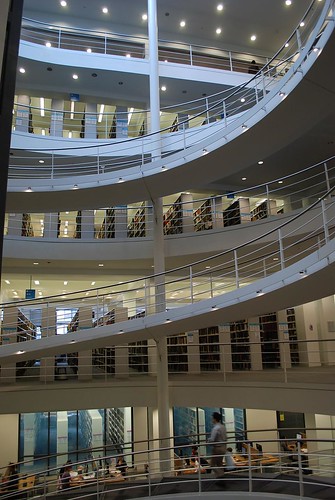 Last week was LSE Teaching Day, which was the second time we ran an event focusing on good practice in teaching for LSE staff. The day was opened by Dr Jonathan Leape who is the Course Director for LSE100, the new core course for undergraduates, which teaches them to ‘think like a social scientist’. Jonathan gave us an overview of lessons learnt from the pilot this year and spoke of the challenges of running a core course. These include the heterogeneity of the students, coming from different disciplines in the school, but also the diverse nature of the teachers on the course. He talked about the extensive teacher training that has been undertaken for the course tutors, the need to promote active learning and raise student engagement and the importance of feedback and evaluation from staff and students involved in the course. The course has used a variety of new technologies, including audio feedback, lecture capture, PRS and texting of ‘muddy points’ from lectures. In addition Moodle is used to provide support and resources.
Last week was LSE Teaching Day, which was the second time we ran an event focusing on good practice in teaching for LSE staff. The day was opened by Dr Jonathan Leape who is the Course Director for LSE100, the new core course for undergraduates, which teaches them to ‘think like a social scientist’. Jonathan gave us an overview of lessons learnt from the pilot this year and spoke of the challenges of running a core course. These include the heterogeneity of the students, coming from different disciplines in the school, but also the diverse nature of the teachers on the course. He talked about the extensive teacher training that has been undertaken for the course tutors, the need to promote active learning and raise student engagement and the importance of feedback and evaluation from staff and students involved in the course. The course has used a variety of new technologies, including audio feedback, lecture capture, PRS and texting of ‘muddy points’ from lectures. In addition Moodle is used to provide support and resources.
Our keynote was given by Professor Nicola Lacey, from the Department of Law, who told us she was going to be controversial. She talked about the skills agenda and asked whether teaching skills was at cross purposes with research led teaching at LSE. She asked why there was a pressure to teach skills now, and gave us four reasons for this, which she emphasised were her beliefs and not based on research. Her reason included changes in schools and education, the expansion of higher education, the emphasis on research (which has led to less emphasis on teaching) in universities and the reaction of universities to student surveys. Interestingly she didn’t mention technology, which I would have seen as underpinning all these factors. Nicola believed that teaching quality is actually far higher now than ever before, but felt students have heightened expectations of what university education can give them. She also questioned the value of lecture capture, believing it can make lecturers more cautious, and students more inclined to see the lecture as being a definitive tool for revision – rather than reading books and journal articles. She also worried about hyperlinking every reading in Moodle, seeing this as spoonfeeding . She finished by illustrating how they are dealing with this in the Law department, by developing a skills module for students embedded into the core course for undergraduates. Resources are available in Moodle and there are lectures about study skills and surgeries for students who need help with essay writing.
We then went into parallel sessions and I was involved in a debate with colleagues Dr Claire Gordon, Dr Ernestina Coast and two students, where we debated whether we were teaching the Google Generation. We started by playing the Michael Wesch video: A vision of Students Today. Claire then introduced the session and talked about what the Google Generation might be, and what are the characteristics of this generation. I spoke about my experience of teaching information skills at LSE, including the areas where students seem to struggle – with citing and referencing, with good searching, with knowing how to find scholarly sources. Each of the panel talked for a few minutes and we then took questions from the floor. It was a fascinating session which Claire and I hoped would start a debate over the support and training that students at LSE might need, and what assumptions teachers might make about them in terms of what they know (often incorrectly).
Other sessions I attended during the day included, ‘Using social software tools for teaching Geography’ by Dr Hyun Shin. He had used an amazing range of tools to engage his students, from making his own You Tube videos, to using Facebook and Google groups. His research on cities and urban processes in south east Asia could be shared beyond LSE using many of the tools, and he felt Moodle could be quite restrictive. He was a keen advocate of open access.
The final session I attended was the Lecture Capture debate, where an academic and student took opposing sides to discuss the motion ‘This House Deplores Lecture Capture’. Dr Michael Cox from International Relations, argued that lecture capture was a bad thing while Dr Tim Leunig from Economic History argued it was a good thing. It was a light hearted look at what has been vexing many staff at LSE and is the subject of some research that CLT are currently undertaking. Students generally like lecture capture, but for a range of reasons some staff are opposed to it.
The day ended with a presentation of teaching excellence awards and a wine reception on the eighth floor of our New Academic Building. Well done to my colleague Athina and everyone who made the day interesting and good fun.



 Last week was
Last week was 






